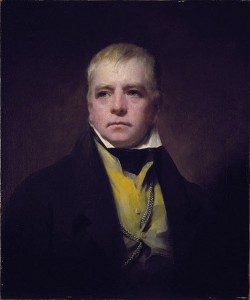My agent, Jody Rein, recently introduced me to an interesting piece in the New York Times about the influence of Sir Walter Scott’s literature on Southern attitudes during the Civil War. The NYT commentary said Scott’s “highly idealized depiction of the age of chivalry  allowed Southern readers and writers to find positive meaning in war’s horrors, hardships and innumerable deaths.”
allowed Southern readers and writers to find positive meaning in war’s horrors, hardships and innumerable deaths.”
The article’s author used my kinsman Brigadier General Turner Ashby, “Knight of the Confederacy” as an example of the romanticized Southern warrior. From Turner’s letters, we know that his favorite author was Sir Walter Scott. Turner organized a group of gentlemen horsemen before the War that he named “The Knights of the Golden Horseshoe,” and held jousting tournaments around Fauquier County, Virginia. Even his home was named “Wolfs Crag” after a place in Scott’s work, The Bride of Lammermoor.
 Turner’s concept of chivalrous warfare swiftly changed to bitterness after the agonized death of his beloved younger brother early in the war. Convinced that his brother had been bayoneted while trying to surrender, he developed an implacable hatred for Northerners and became obsessed with revenge. A fellow officer wrote that Ashby would “quit a meal at any time for a chance at a Yankee… perhaps killed more of them with his own hand than any man in the State.”
Turner’s concept of chivalrous warfare swiftly changed to bitterness after the agonized death of his beloved younger brother early in the war. Convinced that his brother had been bayoneted while trying to surrender, he developed an implacable hatred for Northerners and became obsessed with revenge. A fellow officer wrote that Ashby would “quit a meal at any time for a chance at a Yankee… perhaps killed more of them with his own hand than any man in the State.”
Turner exposed himself to increasing battlefield risks in what I suspect was a death wish (in his letters he mused about whether he could live in a postwar world so starkly changed by the War). He was killed in June 1862, a little more than a year after the War began, leading a charge on foot after his horse was shot. He was 33 years old.
The author of the NYT piece, referring to a poem written after Turner’s death, mused that “Ashby seems better outfitted for a medieval joust than for mid-19th-century armed combat.”
Sadly, Turner probably would have agreed. And I’m sure that he felt that war is truly Hell, with no place for chivalry or romance. The death of chivalry.

Thank you for the information. It made me really think. Many Southerners who lived by “Spirited Chivalry” lost their lives because they honestly believed in something as being real that was actually fiction. The chivalrous actions, though, have not gone with true recognition in the American society and especially in the South. Beside it being the once principle rule of gentlemanly conduct, it is the foundation for polite behavior. Polite behavior can go wrong in the treatment of the fellow human being. Proper table manners and even the clear concise definition of gender roles (which chivalry dictated) is missing a lot in the now. So it has its pros and cons in relating how it affects the now.
VERY NICE